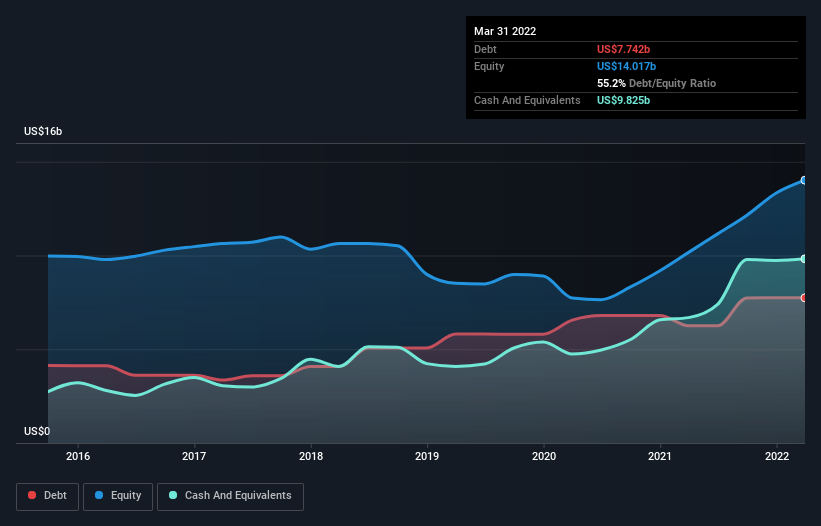- United States
- /
- Semiconductors
- /
- NasdaqGS:TXN
Does Texas Instruments (NASDAQ:TXN) Have A Healthy Balance Sheet?

Some say volatility, rather than debt, is the best way to think about risk as an investor, but Warren Buffett famously said that 'Volatility is far from synonymous with risk.' It's only natural to consider a company's balance sheet when you examine how risky it is, since debt is often involved when a business collapses. We note that Texas Instruments Incorporated (NASDAQ:TXN) does have debt on its balance sheet. But is this debt a concern to shareholders?
When Is Debt A Problem?
Generally speaking, debt only becomes a real problem when a company can't easily pay it off, either by raising capital or with its own cash flow. Ultimately, if the company can't fulfill its legal obligations to repay debt, shareholders could walk away with nothing. While that is not too common, we often do see indebted companies permanently diluting shareholders because lenders force them to raise capital at a distressed price. Having said that, the most common situation is where a company manages its debt reasonably well - and to its own advantage. The first step when considering a company's debt levels is to consider its cash and debt together.
See our latest analysis for Texas Instruments
What Is Texas Instruments's Debt?
You can click the graphic below for the historical numbers, but it shows that as of March 2022 Texas Instruments had US$7.74b of debt, an increase on US$6.25b, over one year. But it also has US$9.83b in cash to offset that, meaning it has US$2.08b net cash.

A Look At Texas Instruments' Liabilities
The latest balance sheet data shows that Texas Instruments had liabilities of US$2.53b due within a year, and liabilities of US$8.73b falling due after that. Offsetting this, it had US$9.83b in cash and US$1.80b in receivables that were due within 12 months. So it actually has US$361.0m more liquid assets than total liabilities.
This state of affairs indicates that Texas Instruments' balance sheet looks quite solid, as its total liabilities are just about equal to its liquid assets. So it's very unlikely that the US$143.4b company is short on cash, but still worth keeping an eye on the balance sheet. Simply put, the fact that Texas Instruments has more cash than debt is arguably a good indication that it can manage its debt safely.
On top of that, Texas Instruments grew its EBIT by 47% over the last twelve months, and that growth will make it easier to handle its debt. There's no doubt that we learn most about debt from the balance sheet. But it is future earnings, more than anything, that will determine Texas Instruments's ability to maintain a healthy balance sheet going forward. So if you're focused on the future you can check out this free report showing analyst profit forecasts.
But our final consideration is also important, because a company cannot pay debt with paper profits; it needs cold hard cash. While Texas Instruments has net cash on its balance sheet, it's still worth taking a look at its ability to convert earnings before interest and tax (EBIT) to free cash flow, to help us understand how quickly it is building (or eroding) that cash balance. During the last three years, Texas Instruments generated free cash flow amounting to a very robust 84% of its EBIT, more than we'd expect. That puts it in a very strong position to pay down debt.
Summing up
While it is always sensible to investigate a company's debt, in this case Texas Instruments has US$2.08b in net cash and a decent-looking balance sheet. The cherry on top was that in converted 84% of that EBIT to free cash flow, bringing in US$6.5b. So we don't think Texas Instruments's use of debt is risky. The balance sheet is clearly the area to focus on when you are analysing debt. However, not all investment risk resides within the balance sheet - far from it. For instance, we've identified 2 warning signs for Texas Instruments (1 makes us a bit uncomfortable) you should be aware of.
When all is said and done, sometimes its easier to focus on companies that don't even need debt. Readers can access a list of growth stocks with zero net debt 100% free, right now.
Valuation is complex, but we're here to simplify it.
Discover if Texas Instruments might be undervalued or overvalued with our detailed analysis, featuring fair value estimates, potential risks, dividends, insider trades, and its financial condition.
Access Free AnalysisHave feedback on this article? Concerned about the content? Get in touch with us directly. Alternatively, email editorial-team (at) simplywallst.com.
This article by Simply Wall St is general in nature. We provide commentary based on historical data and analyst forecasts only using an unbiased methodology and our articles are not intended to be financial advice. It does not constitute a recommendation to buy or sell any stock, and does not take account of your objectives, or your financial situation. We aim to bring you long-term focused analysis driven by fundamental data. Note that our analysis may not factor in the latest price-sensitive company announcements or qualitative material. Simply Wall St has no position in any stocks mentioned.
About NasdaqGS:TXN
Texas Instruments
Designs, manufactures, and sells semiconductors to electronics designers and manufacturers in the United States, China, rest of Asia, Europe, Middle East, Africa, Japan, and internationally.
Adequate balance sheet with moderate growth potential.
Similar Companies
Market Insights
Community Narratives



